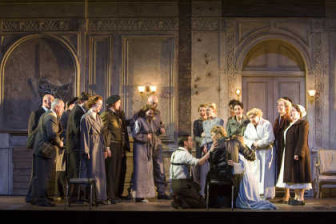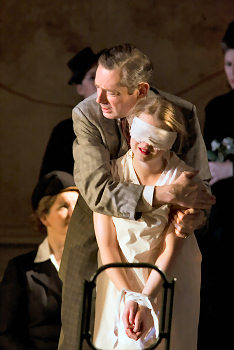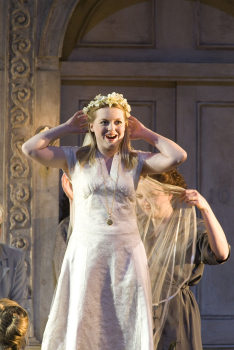|
Editor:
Marc Bridle
Webmaster: Len Mullenger
|
Seen and Heard Opera Review
Handel, Jeptha: ( Revival Premiere) Soloists, Chorus and Orchestra of Welsh National Opera, Donald Nally, conductor, Wales Millennium Centre, Cardiff, 2.3.2006 (GPu)
Conductor: Donald Nally Director: Katie Mitchell Designer: Vicki Mortimer Lighting: Chris Davey Movement Director: Struan Leslie
Jephtha: Mark Padmore Zebul: Neal Davies Storge: Susan Bickley Iphis: Fflur Wyn Hamor: Iestyn Davies Angel: Charlotte Ellett
Producing Handel’s oratorios on the operatic stage has been something of a vogue in recent years. Peter Sellars’ production of Theodora at Glyndebourne in 1996 was a notable example and Saul was presented by Opera North in 2005. Amongst Handel’s oratorios, one of the most obvious candidates for such treatment is Jephtha. At its core is a familiar dramatic nucleus – the vow of a father, made in the desire for military/political success which results in his being required to sacrifice of one of his own children. Long before Handel, this dramatic archetype had served Euripides in his play Iphigenia at Aulis; after Handel it was to be central to at least two significant operas, Mozart’s Idomeneo and Gluck’s Iphigénie en Aulide. So far as I know, the first ‘operatic’ production of Jephtha was this one by Katie Mitchell, staged initially by the Welsh National Opera in 2003 and later presented by ENO too. It was generally much admired when first staged though it received less universally favourable critical treatment when presented by the ENO. This revival is the production's first outing at the Wales Millennium Centre.
Some of the cast of the original production are again on hand: Mark Padmore as Jephtha himself; Susan Bickley as Storge and Charlotte Ellett as the Angel. Paul McCreesh was the original conductor but his place on the podium is now taken by Donald Nally, Chorus Master of WNO.
This is a richly intelligent production, well designed and performed and to discuss Katie Mitchell’s production, some consideration of the history of the story and libretto may be helpful. The story of Jephtha is found in the Old Testament, in Judges Chapter 11. There the exiled Jephtha returns to lead his people in battle against the Ammonites, secretly vowing that if God “shall without fail deliver the children of Ammon into mine hands, Then it shall be that, whatsoever cometh forth of the doors of my house to meet me, when I return in peace from the children of Ammon, shall surely be the LORD's, and I will offer it up for a burnt offering”. He is granted victory and when his daughter is the first creature he sees, she is doomed to death, a death which she accepts willingly. This short narrative was the basis of the libretto prepared for Handel by Thomas Morrell.
Scholars have treated Morell condescendingly, as though he were little more than a bungling amateur and he was certainly no great poet (but then how many librettists, even some of the the greatest, have been?) He was learned and intelligent though, with a very reasonable fluency in verse; David Garrick, James Thomson the poet and William Hogarth were some of his friends. The libretto is well designed and surrounds Jephtha with characters not mentioned in the Biblical text, giving him a wife and giving his daughter a name, which she lacks in the Biblical account. That name is Iphis – surely an allusion to Euripides’ play since Morell published editions of plays by Euripides as well as texts by Aeschylus and Sophocles.
Iphis is given a lover, Hamor which has the advantage of providing Handel with a ‘love interest’ to write for, but there is, I think, more to it than that. Morrell changes the purposes of the ‘deal’ which Jephtha seeks to make with God: while the Biblical Jephtha seeks only victory over Israel’s enemies to preserve his people, Morell’s Jephtha (prior to his vow) has already secured from the Israelites a promise that if he triumphs, he will remain in power afterwards. This is a man driven by personal ambition in a way quite absent from the narrative in Judges.
Morell does not allow Iphis to be killed either, as she is in Judges. When she is prepared for sacrifice, an Angel appears, offering a clarification of the wording of Jephtha’s vow and instructing Jephtha: “thou must dedicate / To God, in pure and virgin state fore’er, / As not an object meet for sacrifice”. This ‘saving’ of the daughter actually parallels Euripides – and perhaps thus explains the choice name – who also avoids sacrifice. Iphigenia vanishes from the altar just as the priest raises the knife (replaced by a deer) and the Messenger who recounts events to her father declares, “It is clear that your daughter has been taken up to heaven”.
Morell reinterpreted the Old Testament narrative in the light of his own – and his time’s – beliefs, as happend often with myths. Having heard Morell preach, James Boswell praised him for his “simple faith” and “his plain, rational, calm piety”. Not for Morrel then, a God who demands human sacrifice. He was evidently less disturbed by a God who was happy to accept the enforced ‘sentencing’ of a young woman, in love and on the brink of marriage, to a life of perpetual chastity, so that her father might retain political power. For Katie Mitchell – and surely for most of her contemporaries – such a God is equally unacceptable.
Katie Mitchell's production is, I would suggest, a theatrical demonstration – vivid and emotionally powerful – of changing concepts of God; of the changing acceptability of a strategy whereby personal political and military desires are justified by the claim that one has God on one’s side; of the dangers posed by those who are willing to sacrifice the young – including the young of their own family – in their pursuit of their own political ambitions.
The
production is a kind of palimpsest of places and times,
of points in man’s moral and intellectual history.
The text speaks of Gilead and of the Ammonites, but
revises their assumptions; the stage setting is in
what looks like a grand eighteenth century building
– thus alluding to the lifetime of composer and librettist
– but it is occupied by a transient population who
belong, perhaps, to a time in the aftermath of the
second World War. Morell’s Chorus of Israelites sings,
near the very beginning, of how: Fierce Moloch, shall our cymbals ring, In dismal dance around the furnace blue. Chemosh no more Will we adore With tinbrell’d anthems to Jehovah due.
The replacement of one god by another, the evolution of man’s concept of divinity and his relationship to it, is the very stuff of Morell’s libretto, of Handel’s music – and of Mitchell’s production.
All the performers serve Mitchell pretty well. The Orchestra was, for the most part, very convincingly idiomatic – quite an achievement when one remembers that many of them must have been playing The Flying Dutchman until very recently! The overture might have been a bit more vivacious, the triplets a little tighter rhythmically, but thereafter all was convincingly idiomatic. Donald Nally is best known as a Chorus master (in the USA and Europe, as well as in the UK), but he is not without experience as an orchestral conductor and here he created and sustained a well-judged orchestral balance.
Mark Padmore is not, to my tastes, possessed of the most intrinsically beautiful of tenor voices, but he brings high musical competence and intelligence to all that he does. In the air ‘Open thy marble jaws, O tomb!’, sung in response to his daughter’s innocently happy greeting at his return from battle, his handling of Handel’s unexpected accents, fragmented rhythms and wide melodic leaps was consummate and heart-rending. In ‘Deeper and deeper still’, before the closing chorus of Act II, he communicated the full complexity and purposeful confusion of Handel’s writing, with its abrupt transitions of emotion and direction and unstable tonality. This was a fitting performance of one of the most amazing arias in all of Handel.
Zebul is not the most rewarding of parts – he is not given the chance to do much more than move the plot forwards – and one was inclined to feel that Neal Davies was wasted to some extent. Certainly he made the best of the role, but was not, I suspect, fully extended.
Susan Bickley’s Storge – Jephtha wife and mother of Iphis, started off a little shakily in her first air, ‘In gentle murmurs will I mourn’, where she seemed to swallow a few words and in which she and the orchestra were not altogether at ease with one another; but thereafter she turned in a powerful, emotionally compelling performance. In ‘Scenes of horror’ she conveyed Storge’s disturbance in a way that both appalled and attracted sympathy, and in later scenes her anger and compassion, her love and contempt alternated almost hysterically in a musically and theatrically convincing representation of her suffering and confusion.
As the young lovers, Fflur Wyn and Iestyn Davies were thoroughly persuasive; initially they were bewitching as flirtatious lovers; later, as events unfolded, they were bewildered innocents in a dangerous world, aspiring to an ideal of nobility which they were unable to sustain emotionally and which they seemed half to suspect was false. A tiny figure, Wyn’s whole stage presence articulated her vulnerability. In the early stages she was an adolescent falling in love for the first time; later she seemed to have regressed to childhood, bound and gagged by her father and prepared for sacrifice in Act III. Just occasionally Wyn’s voice seemed underpowered, but there was much that was beautiful in her singing. In Act II, her song of welcome to her father, ‘Welcome as the cheerful light’, was staged so that we could see only a back view of Jephtha; his reaction to her lovely and playful song, had therefore to be registered in the very way that she conducted herself in singing it, slowly realising that it was not being received in the way she had expected. The effect was exquisite and painful. Wyn and Iestyn Davies – whose countertenor voice was well-produced and attractive – sang with particular beauty in their duets, some of the loveliest music of the whole work (a work which contains a quite extraordinary variety of idioms and moods).
Charlotte Ellett reprised her role as the Angel. She has the profile and hair of an angel in some Florentine panel from the early Renaissance and sung her part with impressive declamatory power. But, in her modern suit and huge feathery white wings there was also – quite deliberately - a slightly absurd air about her since she too embodies changing ideas about the supernatural. In Morell’s libretto there is no indication of her existence until Act III when, as a kind of angelus-ex-machina, she arrives to resolve things satisfactorily (or, at any rate, to the reverend Morell's satisfaction). Mitchell makes her a much more prominent – though silent – stage presence in Act I Scene IV, when Jephtha, newly installed in power, and troubled with “doubtful fancies of the brain” is seen alone on stage – at any rate, in Morel’s libretto. In Mitchell’s production the Angel sits – on the sweeping staircase which serves so many aspects of the production very admirably - awaiting him. It is at her silently mouthed prompting that he makes his dreadful vow. From then on, in almost every appearance which Jephtha makes on stage he is accompanied by the silent, observing presence of the Angel. In all these appearances – until Act III – she is evidently invisible to all the other characters. This leaves open the possibility that ‘his’ angel is not a ‘real’ angel; that she represents a kind of externalisation of an aspect of his own psychological and moral condition. He unconsciously creates her, and she gives him the illusion of divine endorsement of his own desires and policies. He is recognisable as a type - the politician driven by the certainty that God is on his side. We can surely think, without too much difficulty, of some modern parallels – and Mitchell surely has!
In Act III the Angel is visible to everyone; a different kind of status appears to be granted to her. And yet, she is not treated on the whole, as though she inspires real awe or belief. People are more interested in trying to touch her feathers to see what they are made of, or even to steal one! Such slightly comic business is not the kind of directorial self-indulgence it might seem. Intead it is part of a (mostly) subtle strategy whereby the staging of Act III exists as a kind of counterbalance to the literal ‘message’ of Morell’s text (and in the process reveals ways in which Handel’s music might be thought to be doing that already).
The whole of Act III is staged like a kind of anticipatory funeral. ‘Mourners’ sit around in black, as though gathered in a Chapel of Rest, awaiting Iphis’s sacrificial death. She, by contrast, is dressed in simple white. She sings of how she will with “humble resignation” obey “the call of Heav’n”, but Handel follows this with her air, ‘Farewell ye limpid springs and floods’ which celebrates the rhythms of the natural world with a power and beauty which are irresistible. Even as she ostensibly dedicates herself to death and Heaven, her physical manner and the way she has to be manhandled suggest that her words do not - perhaps cannot - tell the whole truth about her feelings. When the Angel has made her decree, words like “happy” (insistently reiterated), “blessed” and “glad” resound across the stage. But no one behaves as though they were happy; body language everywhere contradicts the public declaration of feeling. When Hamor and Iphis must part – so that she can live her life “in pure and virgin state fore’er” – they sing (in a duet which echoes their love duet in Act I) of how they “freely resign” their claims on one another. They have, in fact, to be dragged apart. Storge remains a distraught presence in need of repeated comfort.
Only Jephtha seems, if not exactly happy, at least content with the outcome. He cannot wait to get down to the exercise of the power he has so craved. Soon he is so absorbed in the reading and signing of papers that he doesn’t even notice when his wife and daughter leave – he doesn’t bother to lift his eyes from the papers on his desk in order to watch them leave. His choice of public over private; of political power over family; of personal ambition at the cost of others’ happiness has reaped its reward. There cannot – in this production – help but be some irony in the closing chorus and its declaration that all involved should “in blessings manifold rejoice” and its confident assertion that “Freed from war’s destructive sword, / Peace her plenty round shall spread”. We have heard so many politicians make the same promise that we aren’t able to share Morell’s apparent confidence. His libretto ends (save for a closing ‘Amen’ and ‘Hallelujah’) with the work’s ‘moral’ as he sees it “So are they blest who fear the Lord”. The multiple ironies and moral ambiguities of the tale he has told seem to be more apparent to us than they were to Morell. It is the considerable achievement of this fine production that, while doing justice to the power and beauty of some of Handel’s greatest music, it is not prepared to overlook those ironies and ambiguities. The closing stage picture is of Jephtha looking, across the table, into the eyes of the Angel. What is he thinking? How “blest” does he, should he, feel?
Back to the Top Back to the Index Page |
| ||
|
||||





